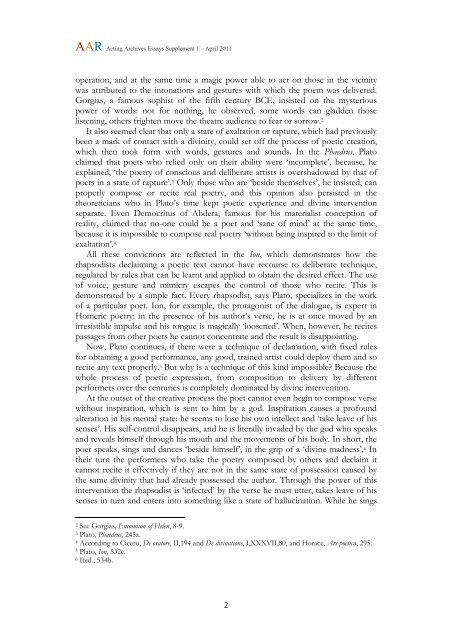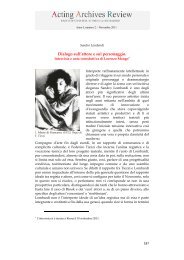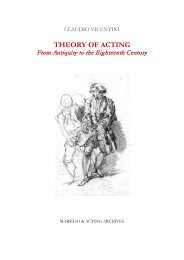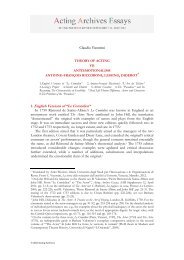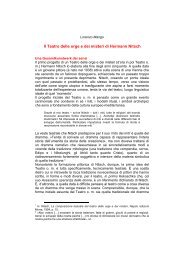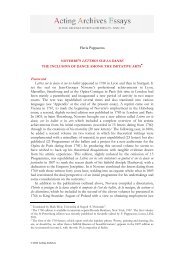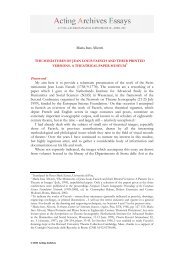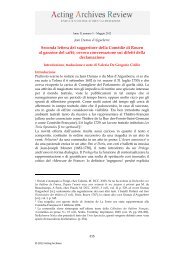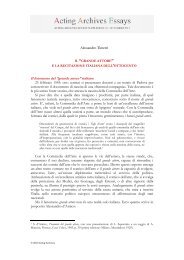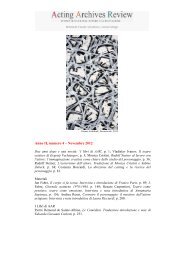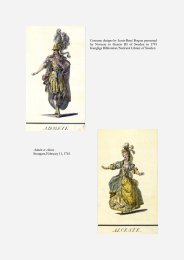Claudio Vicentini_Acting Theory in the Ancient World - Acting Archives
Claudio Vicentini_Acting Theory in the Ancient World - Acting Archives
Claudio Vicentini_Acting Theory in the Ancient World - Acting Archives
Create successful ePaper yourself
Turn your PDF publications into a flip-book with our unique Google optimized e-Paper software.
AAR <strong>Act<strong>in</strong>g</strong> <strong>Archives</strong> Essays Supplement 1 – April 2011operation, and at <strong>the</strong> same time a magic power able to act on those <strong>in</strong> <strong>the</strong> vic<strong>in</strong>itywas attributed to <strong>the</strong> <strong>in</strong>tonations and gestures with which <strong>the</strong> poem was delivered.Gorgias, a famous sophist of <strong>the</strong> fifth century BCE, <strong>in</strong>sisted on <strong>the</strong> mysteriouspower of words: not for noth<strong>in</strong>g, he observed, some words can gladden thoselisten<strong>in</strong>g, o<strong>the</strong>rs frighten move <strong>the</strong> <strong>the</strong>atre audience to fear or sorrow. 2It also seemed clear that only a state of exaltation or rapture, which had previouslybeen a mark of contact with a div<strong>in</strong>ity, could set off <strong>the</strong> process of poetic creation,which <strong>the</strong>n took form with words, gestures and sounds. In <strong>the</strong> Phaedrus, Platoclaimed that poets who relied only on <strong>the</strong>ir ability were ‘<strong>in</strong>complete’, because, heexpla<strong>in</strong>ed, ‘<strong>the</strong> poetry of conscious and deliberate artists is overshadowed by that ofpoets <strong>in</strong> a state of rapture’. 3 Only those who are ‘beside <strong>the</strong>mselves’, he <strong>in</strong>sisted, canproperly compose or recite real poetry, and this op<strong>in</strong>ion also persisted <strong>in</strong> <strong>the</strong><strong>the</strong>oreticians who <strong>in</strong> Plato’s time kept poetic experience and div<strong>in</strong>e <strong>in</strong>terventionseparate. Even Democritus of Abdera, famous for his materialist conception ofreality, claimed that no-one could be a poet and ‘sane of m<strong>in</strong>d’ at <strong>the</strong> same time,because it is impossible to compose real poetry ‘without be<strong>in</strong>g <strong>in</strong>spired to <strong>the</strong> limit ofexaltation’. 4All <strong>the</strong>se convictions are reflected <strong>in</strong> <strong>the</strong> Ion, which demonstrates how <strong>the</strong>rhapsodists declaim<strong>in</strong>g a poetic text cannot have recourse to deliberate technique,regulated by rules that can be learnt and applied to obta<strong>in</strong> <strong>the</strong> desired effect. The useof voice, gesture and mimicry escapes <strong>the</strong> control of those who recite. This isdemonstrated by a simple fact. Every rhapsodist, says Plato, specializes <strong>in</strong> <strong>the</strong> workof a particular poet. Ion, for example, <strong>the</strong> protagonist of <strong>the</strong> dialogue, is expert <strong>in</strong>Homeric poetry: <strong>in</strong> <strong>the</strong> presence of his author’s verse, he is at once moved by anirresistible impulse and his tongue is magically ‘loosened’. When, however, he recitespassages from o<strong>the</strong>r poets he cannot concentrate and <strong>the</strong> result is disappo<strong>in</strong>t<strong>in</strong>g.Now, Plato cont<strong>in</strong>ues, if <strong>the</strong>re were a technique of declamation, with fixed rulesfor obta<strong>in</strong><strong>in</strong>g a good performance, any good, tra<strong>in</strong>ed artist could deploy <strong>the</strong>m and sorecite any text properly. 5 But why is a technique of this k<strong>in</strong>d impossible? Because <strong>the</strong>whole process of poetic expression, from composition to delivery by differentperformers over <strong>the</strong> centuries is completely dom<strong>in</strong>ated by div<strong>in</strong>e <strong>in</strong>tervention.At <strong>the</strong> outset of <strong>the</strong> creative process <strong>the</strong> poet cannot even beg<strong>in</strong> to compose versewithout <strong>in</strong>spiration, which is sent to him by a god. Inspiration causes a profoundalteration <strong>in</strong> his mental state: he seems to lose his own <strong>in</strong>tellect and ‘take leave of hissenses’. His self-control disappears, and he is literally <strong>in</strong>vaded by <strong>the</strong> god who speaksand reveals himself through his mouth and <strong>the</strong> movements of his body. In short, <strong>the</strong>poet speaks, s<strong>in</strong>gs and dances ‘beside himself’, <strong>in</strong> <strong>the</strong> grip of a ‘div<strong>in</strong>e madness’. 6 In<strong>the</strong>ir turn <strong>the</strong> performers who take <strong>the</strong> poetry composed by o<strong>the</strong>rs and declaim itcannot recite it effectively if <strong>the</strong>y are not <strong>in</strong> <strong>the</strong> same state of possession caused by<strong>the</strong> same div<strong>in</strong>ity that had already possessed <strong>the</strong> author. Through <strong>the</strong> power of this<strong>in</strong>tervention <strong>the</strong> rhapsodist is ‘<strong>in</strong>fected’ by <strong>the</strong> verse he must utter, takes leave of hissenses <strong>in</strong> turn and enters <strong>in</strong>to someth<strong>in</strong>g like a state of halluc<strong>in</strong>ation. While he s<strong>in</strong>gs2 See Gorgias, Encomium of Helen, 8-9.3 Plato, Phaedrus, 245a.4 Accord<strong>in</strong>g to Cicero, De oratore, II,194 and De div<strong>in</strong>atione, I,XXXVII,80, and Horace, Ars poetica, 295.5 Plato, Ion, 532c.6 Ibid., 534b.2


